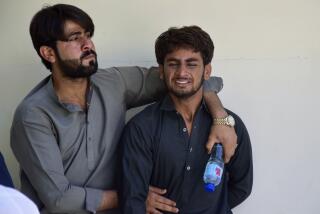Car bombings, other attacks kill 51 in Iraq
- Share via
Reporting from Baghdad — Insurgents struck across Iraq on Wednesday, killing more than 50 people in bombing and shooting attacks. The violence hit 11 towns and cities from north to south and appeared timed to undermine confidence in the Iraqi army and police as the U.S. military ends its formal combat mission in the country.
The attacks pointed to the enduring capabilities of militant groups when the U.S. military and Iraqi forces have depicted Al Qaeda in Iraq and its brethren as no match for the Iraqi army.
The bloodshed came amid Iraqis’ frustration over the failure of political blocs to form a new government nearly six months after national elections. U.S. officials have insisted that Iraq is stable, even if the country is locked in a political stalemate and fears are mounting among Iraqis that their nation’s stability is in fact eroding.
Iraq’s leaders, including Prime Minister Nouri Maliki, blamed Al Qaeda in Iraq and the late dictator Saddam Hussein’s Baath Party for the attacks and vowed to apprehend the culprits.
In one of the deadliest assaults Wednesday, a car bomb struck a police station in Kut, about 100 miles southeast of Baghdad, near the offices of the Wasit province governor. The attack killed 16 people and wounded 18, Gov. Latif Turfa said.
“I think terrorists and Baathists are trying to move the battle to Kut, which was calm all these years,” Turfa said. “There is definitely a security breach and negligence by the security agencies.”
In Baghdad, a suicide car bomber exploded his vehicle at a police station in the northeastern neighborhood of Qahira, killing at least 18 people, including six police officers, police said. The blast left 60 people wounded.
Four people were killed in other attacks in the capital.
“Why are these attacks happening now after the U.S. withdrawal? Where are the security agencies? We can’t live forever without security,” said laborer Ahmed Fadhil, who was wounded in the Qahira bombing.
Explosions disrupted the east-central province of Diyala. At least six people were killed in bombings in the cities of Baqubah and Muqdadiya.
Insurgents also blew up the homes of three police officers and one electoral commission employee in Buhriz, just south of Baqubah, police said. Five people were wounded and the attackers planted the black flag of the Islamic State of Iraq, an umbrella group for militants that includes Al Qaeda in Iraq, police said. Six more bombs exploded in the town of Balad Ruz, about 45 miles east, injuring five people.
The strife also spread to Anbar province. The western region, once the symbol of the country’s Sunni insurgency, had quieted after 2007 because of a local revolt against Al Qaeda in Iraq. But the last year has seen a return to violence.
In the province’s capital, Ramadi, a car bomb exploded at a bus station, killing two police officers and a civilian, police said. At least four people were killed in attacks elsewhere in the city and in nearby Fallouja.
A car bombing in the northern city of Mosul left three soldiers and a civilian injured.
Insurgents also managed to cause mayhem across southern Iraq. Car bombs exploded in Basra and Karbala, injuring at least 30 people, according to police and medical sources.
The attacks came after the announcement Tuesday by the U.S. military that American troop numbers had dropped to 49,700 as the military switched from a combat mission to the job of training the Iraqi army and police forces and assisting them when asked.
Many Iraqis have expressed concern that the scaled-back American presence could help fuel violence.
ned.parker@latimes.com
Mohammed is a Times staff writer. Times staff writer Nadeem Hamid contributed to this report.
More to Read
Sign up for Essential California
The most important California stories and recommendations in your inbox every morning.
You may occasionally receive promotional content from the Los Angeles Times.













